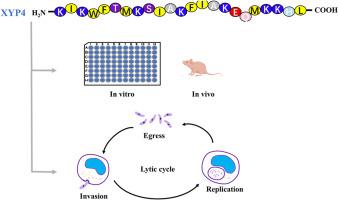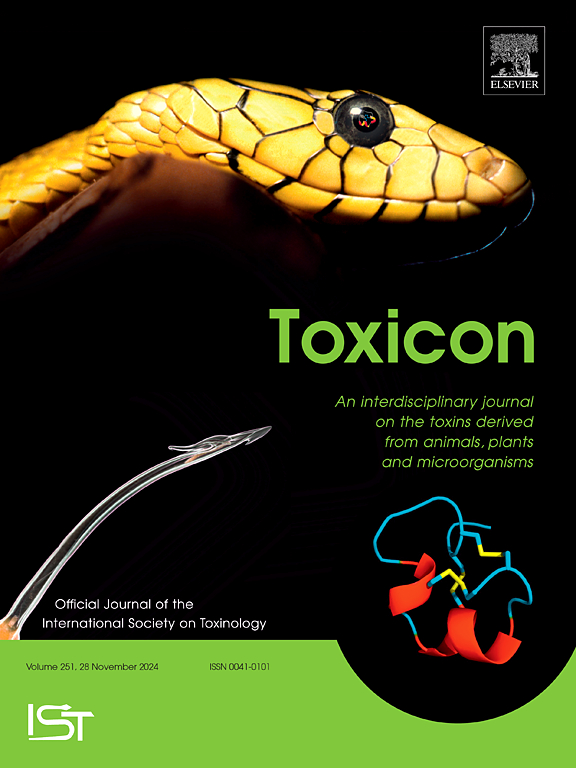Anti-Toxoplasma gondii studies of the venom peptide XYP4 from the Lycosa coelestis
IF 2.4
4区 医学
Q2 PHARMACOLOGY & PHARMACY
引用次数: 0
Abstract
Toxoplasma gondii (T. gondii) is an intracellular parasite with multiple routes of infection that poses a serious health risk to pregnant women, fetuses, and immunocompromised populations. Currently, clinical drugs in the treatment of toxoplasmosis continue to face challenges such as drug resistance. In the face of this challenge, researchers have gradually focused on the potential medicinal value of animal venoms in the fight against T. gondii, especially venom peptides showing advantages such as high potency, membrane targeting, and immunomodulation. The present study aimed to explore whether XYP4, a peptide derived from the venom of the Lycosa coelestis (L. coelestis), possesses better anti-T. gondii activity and its mode of action. The experimental results showed that XYP4 is an amphiphilic cationic linear polypeptide with an α-helix, which can exert anti-toxoplasma activity at low concentrations, affecting the lytic cycle. This polypeptide showed moderate survival benefits in mice infected with T. gondii. The main modes of action of XYP4 include inhibition of tachyzoites' intracellular proliferation, modulation of inflammatory factor expression in the host cells, and disruption of tachyzoite membrane integrity.

鼠狼毒肽XYP4抗刚地弓形虫的研究。
刚地弓形虫是一种具有多种感染途径的细胞内寄生虫,对孕妇、胎儿和免疫功能低下人群构成严重的健康风险。目前,临床治疗弓形虫病的药物继续面临耐药性等挑战。面对这一挑战,研究人员逐渐关注动物毒液在对抗弓形虫中的潜在药用价值,特别是毒液肽具有高效、膜靶向和免疫调节等优势。本研究旨在探讨从狼毒(L. coelestis)中提取的肽XYP4是否具有较好的抗t。弓形虫的活性及其作用方式。实验结果表明,XYP4是一种具有α-螺旋结构的两亲性阳离子线性多肽,在低浓度下可发挥抗弓形虫活性,影响其裂解周期。这种多肽在感染弓形虫的小鼠中显示出适度的生存益处。XYP4的主要作用方式包括抑制速殖子胞内增殖、调节宿主细胞中炎症因子的表达、破坏速殖子膜的完整性。
本文章由计算机程序翻译,如有差异,请以英文原文为准。
求助全文
约1分钟内获得全文
求助全文
来源期刊

Toxicon
医学-毒理学
CiteScore
4.80
自引率
10.70%
发文量
358
审稿时长
68 days
期刊介绍:
Toxicon has an open access mirror Toxicon: X, sharing the same aims and scope, editorial team, submission system and rigorous peer review. An introductory offer Toxicon: X - full waiver of the Open Access fee.
Toxicon''s "aims and scope" are to publish:
-articles containing the results of original research on problems related to toxins derived from animals, plants and microorganisms
-papers on novel findings related to the chemical, pharmacological, toxicological, and immunological properties of natural toxins
-molecular biological studies of toxins and other genes from poisonous and venomous organisms that advance understanding of the role or function of toxins
-clinical observations on poisoning and envenoming where a new therapeutic principle has been proposed or a decidedly superior clinical result has been obtained.
-material on the use of toxins as tools in studying biological processes and material on subjects related to venom and antivenom problems.
-articles on the translational application of toxins, for example as drugs and insecticides
-epidemiological studies on envenoming or poisoning, so long as they highlight a previously unrecognised medical problem or provide insight into the prevention or medical treatment of envenoming or poisoning. Retrospective surveys of hospital records, especially those lacking species identification, will not be considered for publication. Properly designed prospective community-based surveys are strongly encouraged.
-articles describing well-known activities of venoms, such as antibacterial, anticancer, and analgesic activities of arachnid venoms, without any attempt to define the mechanism of action or purify the active component, will not be considered for publication in Toxicon.
-review articles on problems related to toxinology.
To encourage the exchange of ideas, sections of the journal may be devoted to Short Communications, Letters to the Editor and activities of the affiliated societies.
 求助内容:
求助内容: 应助结果提醒方式:
应助结果提醒方式:


